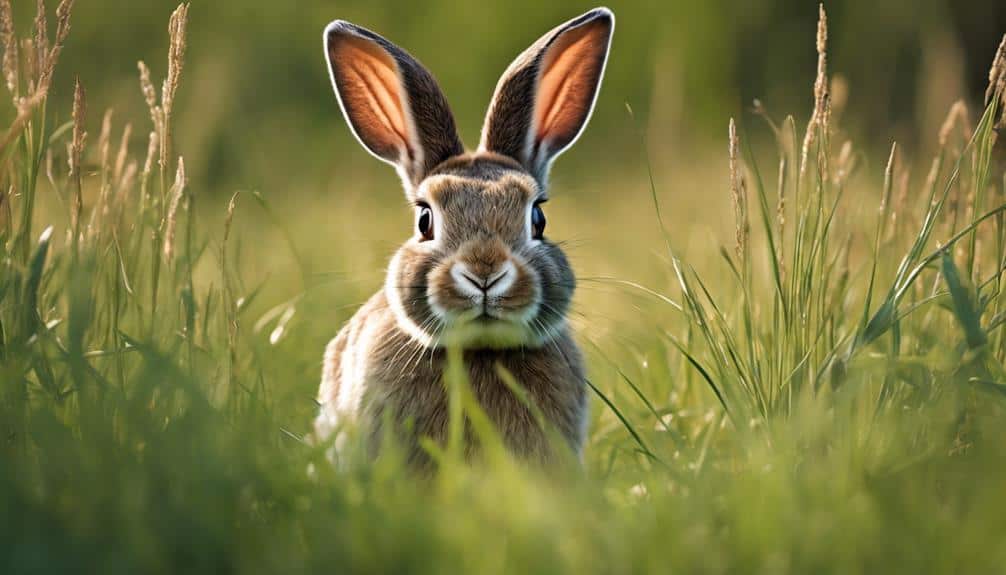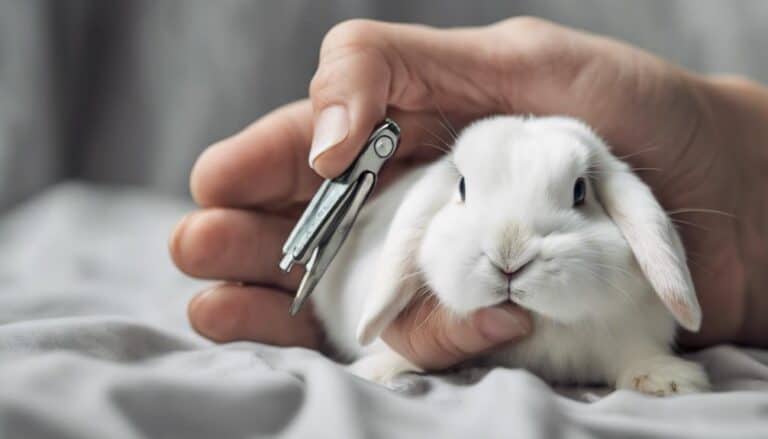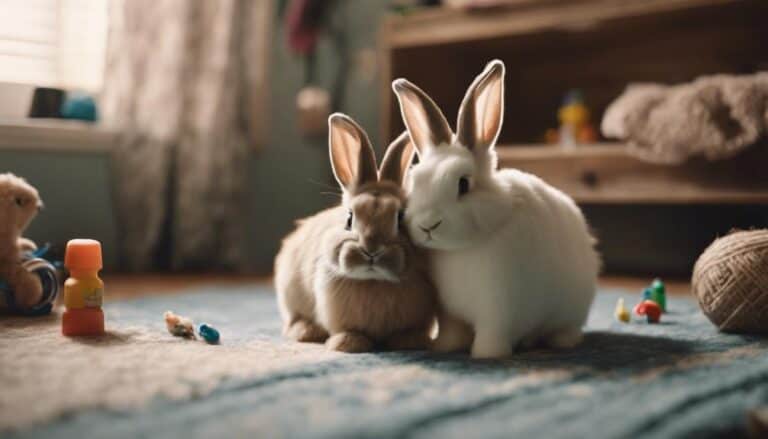Have you ever wondered if bunnies run away?
The answer might surprise you. Understanding the motivations behind a bunny's escape can shed light on how to prevent it from happening.
By exploring the reasons behind bunny behavior and learning how to create a safe environment, you can better prepare yourself for any unexpected bunny adventures.
Contents
- 1 Key Takeaways
- 2 Reasons Behind Bunny Escapes
- 3 Importance of Bunny Trust
- 4 Lost Bunny Predicament
- 5 Outdoor Bunny Safety Tips
- 6 Finding a Runaway Bunny
- 7 Indoor Bunny Behavior
- 8 Rabbit Survival in the Wild
- 9 Catching a Lost Rabbit
- 10 Rabbit Loneliness and Solutions
- 11 Frequently Asked Questions
- 12 Do Bunnies Run Away During Winter to Survive?
- 13 Conclusion
Key Takeaways
- Rabbits escape due to curiosity, fear, and unmet needs.
- Building trust with bunnies prevents runaway incidents.
- Lost bunny management involves patience and gentle care.
- Implement outdoor safety measures to protect bunnies from harm.
Reasons Behind Bunny Escapes

Rabbits often escape due to their innate curiosity and longing for exploration. When a rabbit feels fear or perceives threats in its environment, it may instinctively seek to run away. Additionally, unmet needs such as stress, boredom, or loneliness can drive a rabbit to escape its confines in search of fulfillment.
These motivations can lead rabbits to find escape routes, including chewing through hutch wire or squeezing through small spaces. Their ability to climb fences adds to the challenge of containment, as rabbits may scale barriers to freedom. Once outside, rabbits might choose to hide nearby, making it difficult for their caregivers to locate them.
Understanding these reasons behind bunny escapes can help caregivers take proactive measures to ensure the safety and well-being of their furry companions.
Importance of Bunny Trust
Building trust with your bunny is essential for a strong and positive relationship. Trust fosters a sense of security, reducing fear and stress in your pet.
Consistent care, gentle handling, and understanding your bunny's behavior are key in establishing this vital bond.
Building Bunny Bond
Establishing trust with your furry companion is pivotal in fostering a strong and lasting bond, imperative for preventing runaway incidents. Spending quality time with your rabbit, offering treats, and being attentive to their body language are key steps in building trust.
Avoid excessive handling, as it can cause fear and trust issues, hindering the bond. Providing a safe and spacious environment for your rabbit contributes to their sense of security, reducing the likelihood of them running away. Recognizing signs of fear or discomfort in your rabbit and addressing them promptly can further strengthen the bond and trust between you.
Establishing Trust Through Care
Gaining a bunny's trust relies heavily on providing proper care and positive interactions. When building trust with rabbits, it's important to understand their body language and cater to their needs.
Here are five essential tips to help you establish trust with your bunny:
- Offer treats and positive experiences to create a bond of trust.
- Learn to interpret bunny body language for effective communication.
- Spend quality time with your rabbit to strengthen the bond and trust.
- Handle your bunny gently and consistently to build a sense of security.
- Provide proper care and attention to show your rabbit that they're valued and loved.
Lost Bunny Predicament

When faced with a lost bunny predicament, how can you effectively encourage their return home? Lost bunnies tend to seek refuge in small, sheltered spaces when frightened, often staying close to their home environment. To attract them back home, provide food and water in familiar areas they frequent. Additionally, checking local shelters and rescue organizations can aid in locating a missing bunny. When approaching a lost bunny, remain patient and calm to avoid scaring them further. Remember, bunnies are delicate creatures that respond well to gentle care.
| Strategies to Encourage Bunny's Return Home | |
|---|---|
| 1. Provide food and water in familiar areas | 2. Check local shelters and rescue organizations |
| 3. Approach the lost bunny with patience and calmness | 4. Create a comfortable and safe environment at home |
Outdoor Bunny Safety Tips
To confirm the safety of your outdoor bunny, implementing proper precautions is essential to prevent potential escape and protect them from predators. Here are some essential outdoor bunny safety tips to guarantee your pet's well-being:
- Secure Enclosures: Build or invest in a sturdy fence to prevent your bunny from wandering off.
- Predator Protection: Protect your bunny from predators like birds of prey by providing secure enclosures or supervision.
- Chemical-Free Grass: Gradually introduce grass into their diet, making sure it's free from harmful chemicals.
- Supervision: Properly supervise your pet when they're outside to guarantee their safety.
- Regular Checks: Check the enclosure regularly for any vulnerabilities that may allow your bunny to escape.
Finding a Runaway Bunny

If your bunny has gone missing, taking immediate action and implementing effective strategies can help in locating your runaway pet. Pet rabbits are prey animals, so they might run away due to fear or curiosity.
To comfort your bunny and encourage it to return, leave out familiar items like its bedding or toys in your yard. Providing food and water can also attract a runaway bunny back home. Trust plays a significant role in reuniting with your pet, so approach it calmly and avoid sudden movements.
Search your local area thoroughly, checking places like bushes, under decks, or sheds where rabbits might hide. Contact nearby shelters, veterinarians, and neighbors to notify them about your missing pet. Use tools like nets, gloves, carriers, and treats to safely catch your bunny once you spot it.
Remember to be patient and provide a safe environment for your bunny's return.
Indoor Bunny Behavior
Indoor bunnies may exhibit escape behavior when feeling threatened or stressed. It's crucial to understand their instincts as prey animals to create a safe indoor environment.
Here are some tips to help you prevent your indoor bunny from running away:
- Take immediate action: If your bunny seems scared or anxious, address the situation promptly.
- Back off: When your bunny shows signs of distress, give them space to calm down.
- Around the clock care: Providing constant attention and care can help build trust and reduce escape attempts.
- Quickly identify stressors: Be observant of your bunny's behavior to identify and eliminate sources of stress.
- Let them come to you: Building a bond based on trust will make your bunny less likely to try to run away.
Rabbit Survival in the Wild

Understanding the challenges domestic rabbits face when attempting to survive in the wild sheds light on their vulnerability and the importance of responsible ownership. Domestic rabbits, with their instincts as prey animals, lack the necessary survival skills to thrive outdoors. Releasing a pet rabbit outside can lead to them feeling trapped, as their sense of direction is often limited. Their inability to find suitable food sources on their own makes survival in the wild unlikely for them. It is important to realize that these cute pets are not adapted to fend for themselves in the wild; they depend on human care. Here is a table illustrating the key differences between domestic rabbits and wild rabbits:
| Domestic Rabbits | Wild Rabbits |
|---|---|
| Lack survival skills | Have natural instincts for survival |
| Dependent on human care | Independent in the wild |
| Fear and hunger when outside | Adapted to find food and shelter |
| Unlikely to survive outdoors | Thrive in their natural habitat |
Catching a Lost Rabbit
When trying to catch a lost rabbit, utilize its favorite treats to entice it back to safety. If a rabbit feels cornered, it may try to run away as quickly as possible. To catch a lost pet rabbit, make sure to stay calm and take care to not scare it further.
Here are some tips to help you capture a lost rabbit effectively:
- Form a group to slowly and calmly corner the lost rabbit for capture.
- Place the rabbit's cage outside with food and water to create a familiar and safe space for them.
- Avoid sudden movements or chasing the rabbit, as it may cause further fear and resistance.
- Monitor the rabbit's movements closely to track their location and behavior during the capture process.
Rabbit Loneliness and Solutions

Loneliness can lead rabbits to run away, prompting the need for companionship. Providing a rabbit with another bunny can decrease the likelihood of escape attempts.
Enhancing your rabbit's environment and social interactions can contribute to their well-being.
Signs of Loneliness
If your bunny exhibits behaviors like excessive grooming or hiding, it may be showing signs of loneliness. To help you recognize and address this issue effectively, here are some key points to keep in mind:
- Loneliness in rabbits can lead to stress, depression, and health issues.
- Providing companionship through another rabbit or spending quality time with your bunny can help alleviate loneliness.
- Enriching your rabbit's environment with toys, tunnels, and interactive play can combat loneliness.
- Monitoring your rabbit's behavior and seeking veterinary advice if loneliness persists is essential for their well-being.
Bonding With Another
To address rabbit loneliness effectively, consider introducing another rabbit for companionship to improve their overall well-being. Bonding rabbits can be a rewarding experience, but it requires careful monitoring of their interactions. It is advisable to pair same-sex rabbits or make sure they are spayed/neutered to prevent unwanted breeding. Patience is key when introducing rabbits to each other, as it may take time for them to establish a strong bond. By providing your rabbit with a companion, you can help alleviate their loneliness and create a happier environment for them.
| Bonding Tips | Description |
|---|---|
| Monitor Interactions | Watch how the rabbits interact closely |
| Same-Sex Pairs | Pair rabbits of the same sex for compatibility |
| Spayed/Neutered Rabbits | Prevent breeding by making sure they are fixed |
Enriching Rabbit Environment
Enrich your rabbit's environment with interactive toys, tunnels, and hiding spots to prevent boredom and promote mental stimulation for a happier, healthier rabbit. Here are five ways to make your rabbits feel more at home and less likely to run away:
- Provide a comfortable home base with cozy bedding and a quiet retreat area.
- Set up tunnels and mazes for your rabbits to explore and play in.
- Place interactive toys like puzzle feeders and chew toys to keep them engaged.
- Create hiding spots using cardboard boxes or tunnels for a sense of security.
- Rotate toys and rearrange their environment to prevent monotony and encourage exploration.
Frequently Asked Questions
Do Rabbits Come Back if They Run Away?
If a rabbit runs away, it may not return due to its domestic nature. Catching it can be tricky. Take proactive measures like contacting local resources. A runaway bunny might come back, but it's uncertain.
How Do You Find an Escaped Rabbit?
If your rabbit escapes, contact shelters, vets, and neighbors. Spread the word online and in your area. Leave food out and approach calmly. Act quickly to increase chances of finding and safely bringing your bunny home.
Will My Bunny Run Away if I Let It Outside?
If you let your bunny outside, it may run away due to its curious nature. To prevent this, create a secure outdoor enclosure, supervise playtime, and consider leash training. Taking precautions guarantees your pet's safety.
How Far Will a Rabbit Travel?
Rabbit instincts guide them to stay within their territorial boundaries, influenced by predators' impact. They exhibit specific travel patterns, mainly staying close to familiar environments. Using tracking methods and safety precautions can help monitor and protect them.
Do Bunnies Run Away During Winter to Survive?
During winter, bunnies’ winter survival strategies include staying active to keep warm and finding food sources. While some may burrow in the snow, others will venture out to find hiding spots and rely on their thick fur to keep them warm. They are resourceful creatures when it comes to surviving the cold.
Conclusion
So, do bunnies run away? Like a fleeting shadow in the night, these furry creatures may escape for various reasons. By understanding their behavior, building trust, and taking precautions, you can guarantee bunny escapes.
If your bunny does go missing, remain calm and act swiftly to confirm their well-being. Remember, with care and attention, you can keep your bunny safe and happy in their environment.






